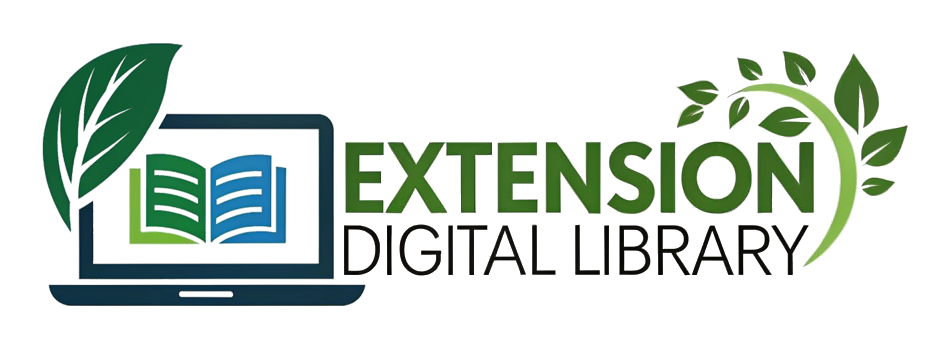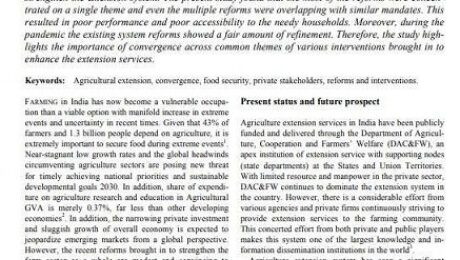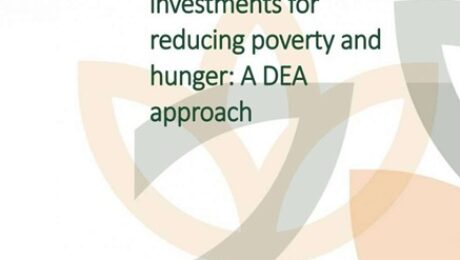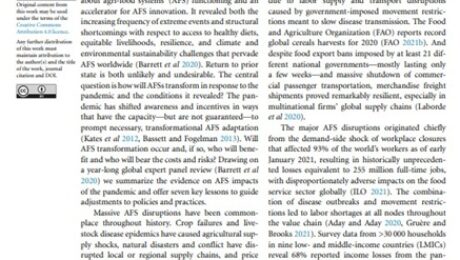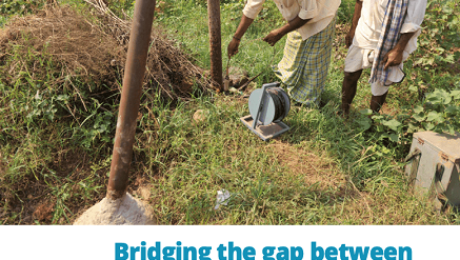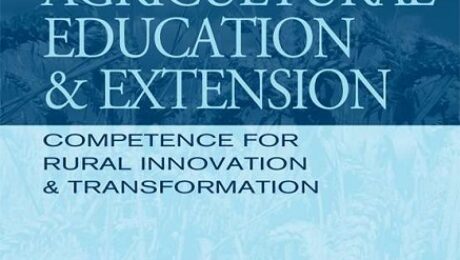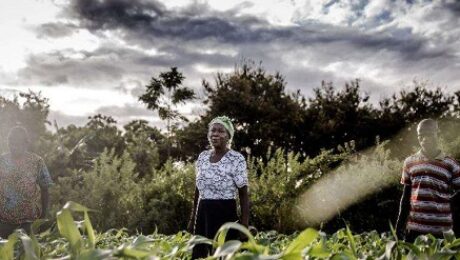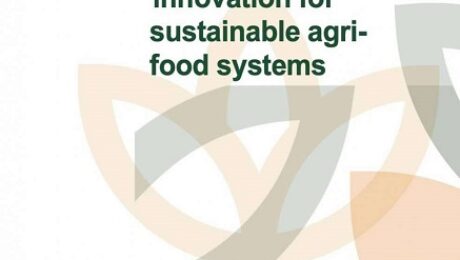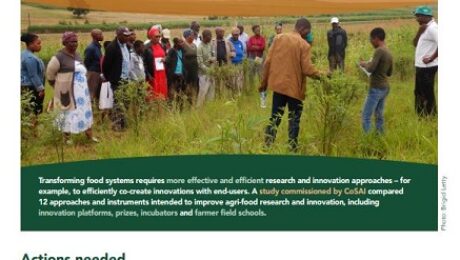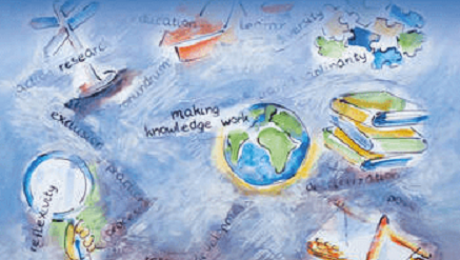State of Agricultural Extension reforms in India and the need of convergence
Extension reforms play a significant role in catalysing the extant policies and provisions that are affecting the extension service across India. Although the country has seen a series of reforms in the past seven decades, the changing contours of agriculture over the years demand new sets of interventions and reform measures. Regimes in the past decades have brought a series of measures to strengthen the extension system. The present study found that the most of the reforms were concentrated on a single theme and even the multiple reforms were overlapping with similar mandates. This resulted in poor performance and poor accessibility to the needy households. Moreover, during the pandemic the existing system reforms showed a fair amount of refinement. Therefore, the study highlights the importance of convergence across common themes of various interventions brought in to enhance the extension services.
- Published in EXTENSION AND INNOVATION, POLICY
The role of extension and financial services in boosting the effect of innovation investments for reducing poverty and hunger: A DEA approach
Increasing investment and spending in agricultural innovation is not enough to meet Sustainable Development Goal (SDG) targets of ending poverty and hunger because the effectiveness of investments in low- and middle-income (LMI) countries is affected by the low quality of infrastructure and services provided, and by different norms and practices that create a considerable gap between financing known technical solutions and achieving the outcomes called for in the SDGs. As an important part of a nation’s common innovation infrastructure, financial and extension services are major “enablers” of investments, favorably contributing to national innovative capacity. However, the contribution of these services to innovation in LMI countries has been limited. Financial services in LMI countries face low rates of return; high risks and lack of acceptable collateral; and limited outreach in rural areas. Similarly, the performance of extension services has been affected by ineffective and costly strategies that have promoted rigid recommendations with poor understanding of how farmers learn and lacked context-specific focus on solving problems.
- Published in EXTENSION AND INNOVATION, POLICY
COVID-19 pandemic lessons for agri-food systems innovation
The crucial questions are what AFS changes the COVID-19 pandemic will induce and how to shift the odds in favor of beneficial transformation? The adaptations that AVC businesses, governments, and NGOs make now to their policies and practices in response to the pandemic—in institutions and policies, as much as in technologies—will have lasting effects. We have less confidence that key AFS organizations and their leaders will make those adaptations than we have that such changes are increasingly, undeniably necessary. If leaders can learn these seven key AFS lessons of this pandemic, however, it will maximize the odds of innovation that ushers in healthier, more equitable, resilient and sustainable AFS.
- Published in EXTENSION AND INNOVATION
Bridging the Gap Between Nutrition and Agriculture in Telangana State, India an Assessment of Capacity Within Agricultural Extension and Advisory Services – FAO and GFRAS (2022)
Equipping agricultural extension and advisory services with nutrition knowledge, competencies and skills is essential to promote nutrition-sensitive agriculture. This report presents the results of an assessment of capacity within agricultural extension and advisory services, undertaken in Telangana State, India, with the global capacity needs assessment (GCNA) methodology developed by FAO and GFRAS. The methodology is available online at https://doi.org/10.4060/cb2069en
- Published in EXTENSION AND INNOVATION, NUTRITION
Multi-actor perspectives in extension, education and system-wide innovations
Systemic, multi-actor, user-centric approaches are increasingly used and promoted by innovation policies to meet complex societal challenges that, often, require socio-technical systems transitions or transformations, and for which there are no ‘one size fits all’ innovations (Ingram et al. 2020; Fieldsend et al. 2021). Integration of different knowledge and perspectives is crucial to catalyse transformative forms of innovation, able to promote more sustainable and resilient development pathways aimed at addressing problems, opportunities and challenges. (Beers, Sol, and Wals 2010; Moschitz et al. 2015).
Multi-actor approaches involve a diversity of actors, including end users of innovation, who engage in iterative learning for change processes (Ingram et al. 2020). These processes demand, in many cases, co-production of knowledge and contact with a range of actors in numerous settings and networks at different scale levels (Leeuwis and Arts 2011). Indeed, transformative changes occur when local bottom-up initiatives are aligned with changes in innovation systems at multiple spatial or institutional scales (Moore, Riddell, and Vocisano 2015).
- Published in EXTENSION AND INNOVATION
Transforming Food Systems: Pathways for Country-led Innovation
The need to urgently transition food systems to net-zero, nature-positive that can nourish all people, leaving no one behind is more critical than ever. The COVID-19 pandemic has furthered deepened complex challenges we already face from hunger and nutrition, climate and nature, and societal inequity. Innovation offers a profound opportunity to achieve these transitions and help unlock challenges across food systems. The white paper ‘Transforming Food Systems: Pathways for Country-led Innovation’, published by the World Economic Forum Food Systems Initiative and the Food and Agriculture Organization of the United Nations (FAO), presents an action-oriented roadmap for countries looking to accelerate and scale inclusive innovation that meet the needs of all stakeholders in the food system and support countries to invest in their capability to innovate. The roadmap builds on the work of the Innovation Lever of Change, a key component of the UN Food Systems Summit, hosted by UN Secretary-General António Guterres, in September 2021. The Innovation Lever convened a diverse community of nearly 80 organizational partners representing the public, private and social sectors who promoted the adoption of a wider, more holistic view of innovation – one that is inclusive of local and traditional knowledge; mobilizes national innovation ecosystems, catalyzes institutional and social innovation; and employs fit for purpose technologies such as the power of data and digital solutions.
- Published in EXTENSION AND INNOVATION
Documenting and scaling up knowledge and innovations – Guidelines and templates
Assessing or understanding the agriculture innovation system (AIS) is an essential step to better understand the needs, new skills and functions needed by the actors and the system. To accelerate the uptake of innovation and progress towards eradicating poverty, there is an urgent need for well-coordinated, demand-driven, and market-oriented information, knowledge, technologies and services.
This document includes a set of information, templates and resources that aim to assist agricultural Innovation systems actors, stakeholders, producers, farmers to develop and share impactful stories. It guides actors and organizations across all sectors in the innovation system to collect and document case studies, success stories, good practices and lessons learned from the project initiatives, trainings and others actions. It highlights scaling-up elements so that other actors can replicate these innovations with a view to scale-up, particularly the stakeholders and actors involved in the DeSira project, through knowledge exchange and sharing.
- Published in EXTENSION AND INNOVATION
Effective approaches and instruments for research and innovation for sustainable agrifood systems
The traditional linear technology transfer model has limited effectiveness in promoting the uptake of technologies and innovations. It fails to account for complexity within the agri-food system, is too simplistic and does not fully consider forward and backward feedback loops in the food system or pay adequate attention to context. There is, therefore, an increasing interest in investors and decision-makers making use of alternative instruments (such as innovation platforms or accelerators) to support innovation processes.
CoSAI commissioned this study to answer the following three key questions:
(1) What types of investment instruments have been tested to support innovation in agri-food systems in the Global South, and how can these be categorized into a working typology?
(2) What is the evidence on how well different instruments have supported SAI’s multiple objectives (e.g. social equality and environmental) at scale and what contextual and design factors affect their success or failure in achieving these objectives (e.g. type of value chain, who participates)?
(3) What advice can be given to innovation investors and practitioners about the instruments selected for different objectives and contexts, and how can selected instruments be designed to achieve better impacts?
- Published in EXTENSION AND INNOVATION
Better instruments and approaches are needed to transform agri-food systems research and innovation
Transforming food systems requires more effective and efficient research and innovation approaches – for example, to efficiently co-create innovations with end-users. A study commissioned by CoSAI compared 12 approaches and instruments intended to improve agri-food research and innovation, including innovation platforms, prizes, incubators and farmer field schools.
- Published in EXTENSION AND INNOVATION
A systemic approach to the decolonisation of knowledge
The authors employ a systems perspective to investigate how coloniality is manifested in the current academic knowledge system and how we can make progress toward the ‘decolonisation of knowledge.’ We reflect on how individual scholars, located in Western donor countries, who benefit from the coloniality of the current knowledge system, can undermine and contest this coloniality with their research and activism. Although we recognise that decolonisation is an ethical issue, we contend that cognitive diversity represents progress and improvements to our pool of knowledge.
- Published in EXTENSION AND INNOVATION
